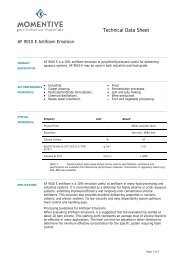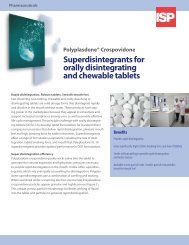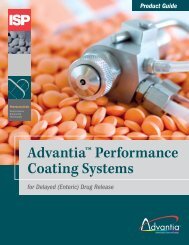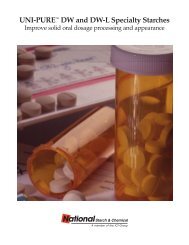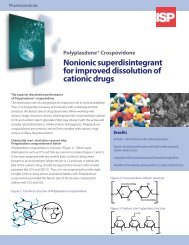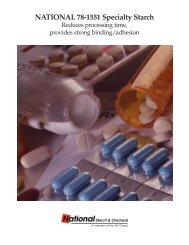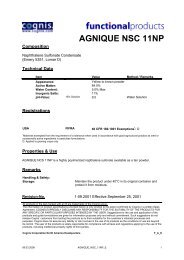Inert Lubricants Oils – Greases – Waxes - Anshul Life Sciences
Inert Lubricants Oils – Greases – Waxes - Anshul Life Sciences
Inert Lubricants Oils – Greases – Waxes - Anshul Life Sciences
Create successful ePaper yourself
Turn your PDF publications into a flip-book with our unique Google optimized e-Paper software.
Most solvent-resistant elastomers and plastics are unaffected by Halocarbon fluids. Within<br />
certain temperature ranges, the fluids may dissolve in and seriously weaken the following<br />
materials:<br />
Buna-N (butadiene/<br />
acrylonitrile)<br />
Buna-S (butadiene/<br />
styrene) rubber<br />
Silicon rubbers<br />
Natural rubber<br />
Polymers or copolymers<br />
of chlortrifluoroethylene<br />
PVC (polyvinyl chloride)<br />
Metals<br />
Halocarbon lubricants wet metallic surfaces readily and form lubricating films similar to the<br />
more common lubricants.<br />
Steel parts that have been lubricated with Halocarbon oils and then cleaned for disassembly<br />
may rust on exposure to air. Rusting can be inhibited by keeping a thin film of oil on the part<br />
or using a Halocarbon oil supplied with a rust inhibitor.<br />
Halocarbon oils and greases are noncorrosive toward metals at temperatures up to about<br />
177°C (350°F), with the exception of copper and some of its alloys, which will discolor at<br />
temperatures over 49°C (120°F). Prior testing should be done on all metals for applications<br />
above 177°C (350°F) and on copper for applications above 49°C (120°F).<br />
Halocarbon oils, greases and waxes, may react with aluminum or magnesium under<br />
conditions of large shear forces such as those found in threaded connections. For example,<br />
a reaction may occur from the tightening of a bolt where aluminum or magnesium is one<br />
of the components and Halocarbon oil or grease is applied to the threads. Such reactions<br />
have been found to be extremely localized and nonpropagating, even though they may be<br />
accompanied by a sharp noise. Such reactions do not always occur, even under large shear<br />
forces. No reaction was observed when ¾" (19.1 mm) flared aluminum hydraulic tubing<br />
lubricated with Halocarbon grease was deliberately tightened on an aluminum coupling until<br />
the threads failed. The torque exerted (over 200 ft-lbs or 271 N-m) destroyed the threads,<br />
but the Halocarbon grease was not affected. Halocarbon oils and greases have been used<br />
routinely in aluminum and magnesium housings, tubing, containers and other parts without<br />
incident. The user should conduct tests to determine the suitability of these materials in this<br />
type of application.<br />
back to Contents<br />
13



